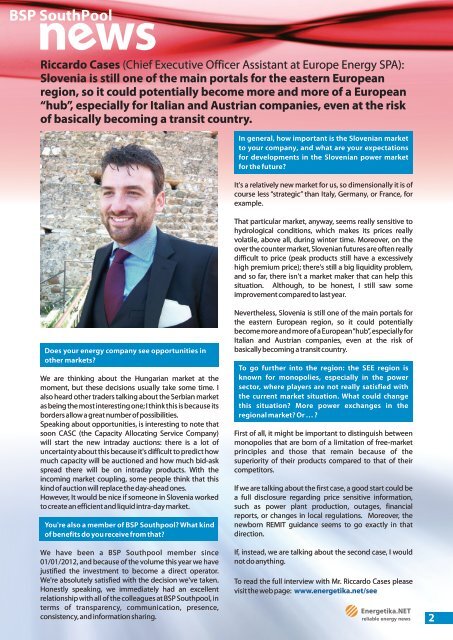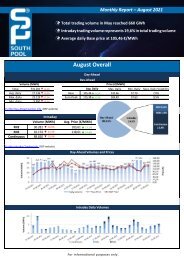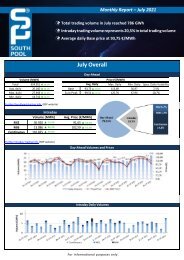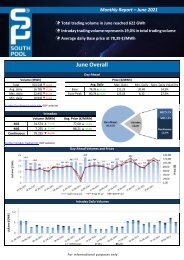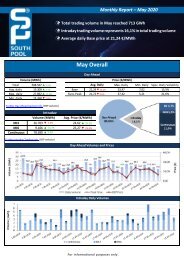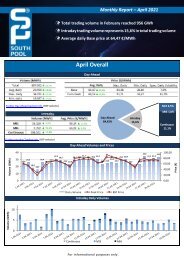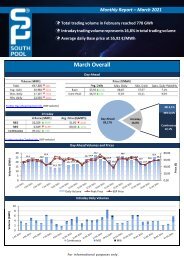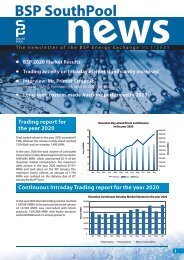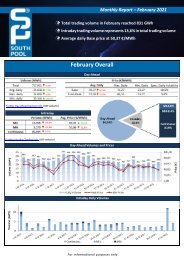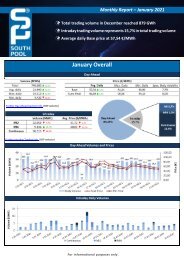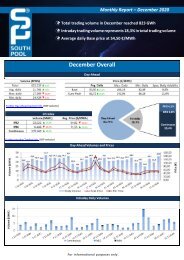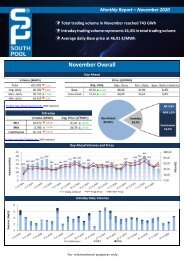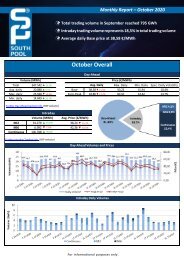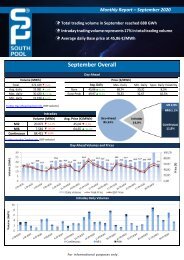BSP SouthPool News June 2012
The newsletter of the BSP Regional Energy Exchange No. 25
The newsletter of the BSP Regional Energy Exchange No. 25
Create successful ePaper yourself
Turn your PDF publications into a flip-book with our unique Google optimized e-Paper software.
<strong>BSP</strong><br />
n<br />
<strong>SouthPool</strong><br />
w<br />
Riccardo Cases (Chief Executive Officer Assistant at Europe Energy SPA):<br />
Slovenia is still one of the main portals for the eastern European<br />
region, so it could potentially become more and more of a European<br />
“hub”, especially for Italian and Austrian companies, even at the risk<br />
of basically becoming a transit country.<br />
In general, how important is the Slovenian market<br />
to your company, and what are your expectations<br />
for developments in the Slovenian power market<br />
for the future?<br />
It's a relatively new market for us, so dimensionally it is of<br />
course less “strategic” than Italy, Germany, or France, for<br />
example.<br />
That particular market, anyway, seems really sensitive to<br />
hydrological conditions, which makes its prices really<br />
volatile, above all, during winter time. Moreover, on the<br />
over the counter market, Slovenian futures are often really<br />
difficult to price (peak products still have a excessively<br />
high premium price); there's still a big liquidity problem,<br />
and so far, there isn't a market maker that can help this<br />
situation. Although, to be honest, I still saw some<br />
improvement compared to last year.<br />
Does your energy company see opportunities in<br />
other markets?<br />
We are thinking about the Hungarian market at the<br />
moment, but these decisions usually take some time. I<br />
also heard other traders talking about the Serbian market<br />
as being the most interesting one; I think this is because its<br />
borders allow a great number of possibilities.<br />
Speaking about opportunities, is interesting to note that<br />
soon CASC (the Capacity Allocating Service Company)<br />
will start the new intraday auctions: there is a lot of<br />
uncertainty about this because it's difficult to predict how<br />
much capacity will be auctioned and how much bid-ask<br />
spread there will be on intraday products. With the<br />
incoming market coupling, some people think that this<br />
kind of auction will replace the day-ahead ones.<br />
However, It would be nice if someone in Slovenia worked<br />
to create an efficient and liquid intra-day market.<br />
You're also a member of <strong>BSP</strong> Southpool? What kind<br />
of benefits do you receive from that?<br />
We have been a <strong>BSP</strong> Southpool member since<br />
01/01/<strong>2012</strong>, and because of the volume this year we have<br />
justified the investment to become a direct operator.<br />
We're absolutely satisfied with the decision we've taken.<br />
Honestly speaking, we immediately had an excellent<br />
relationship with all of the colleagues at <strong>BSP</strong> Southpool, in<br />
terms of transparency, communication, presence,<br />
consistency, and information sharing.<br />
Nevertheless, Slovenia is still one of the main portals for<br />
the eastern European region, so it could potentially<br />
become more and more of a European “hub”, especially for<br />
Italian and Austrian companies, even at the risk of<br />
basically becoming a transit country.<br />
To go further into the region: the SEE region is<br />
known for monopolies, especially in the power<br />
sector, where players are not really satisfied with<br />
the current market situation. What could change<br />
this situation? More power exchanges in the<br />
regional market? Or … ?<br />
First of all, it might be important to distinguish between<br />
monopolies that are born of a limitation of free-market<br />
principles and those that remain because of the<br />
superiority of their products compared to that of their<br />
competitors.<br />
If we are talking about the first case, a good start could be<br />
a full disclosure regarding price sensitive information,<br />
such as power plant production, outages, financial<br />
reports, or changes in local regulations. Moreover, the<br />
newborn REMIT guidance seems to go exactly in that<br />
direction.<br />
If, instead, we are talking about the second case, I would<br />
not do anything.<br />
To read the full interview with Mr. Riccardo Cases please<br />
visit the web page: www.energetika.net/see<br />
2


